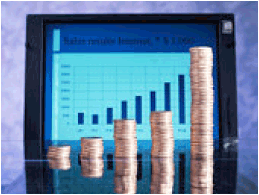CARL WATTS & ASSOCIATES
September 13, 2010

|
Washington DC
|
tel/fax 202 350-9002 |
Securities -- Part 5
Stock Exchange
Stock Exchange
|
|
As is the purpose of any market, the stock market is meant to facilitate the exchange of securities between buyers and sellers. It is considered a secondary market meaning investors trade issued securities without the involvement of the issuing companies.
|
||||||
|
The primary market is where securities are created. By definition an exchange is a mutual transfer of goods, money, services, or their equivalents, so by the object sold apart from the stock exchange or securities exchange, there are also commodities exchange (for raw or primary products) and currency market (trading one currency for another).
|
|||||||
|
The New York Stock Exchange is undoubtedly the most prestigious in the world. NYSE, also called the “Big Board”, was founded over 200 years ago; here all the trading is done face to face on a trading floor. Brokerage firms, that are members of the exchange, send orders on behalf of their investors to the floor brokers who then go to a certain location known as the trading post. Here there is a “specialist” whose job is to match buyers and sellers. The price is set by auction: the current price is the highest amount any buyer is willing to pay and the lowest price at which someone is willing to sell. Details of the trade already done are then sent back to the brokerage firm. This is when you, as an investor, get informed that your stock is sold or bought according to your wish.
|
|||||||
|
|
|||||||
|
To be listed on the NYSE a company must have in excess of 2,200 shareholders with an average daily trading volume of at least 100,000 shares, and generally with pretax earnings over $10 million.
|
||||||
|
NASDAQ differs from NYSE mainly because it is a virtual stock exchange. Trading is done through computers and telecommunications network of dealers. Brokerages act as
|
|||||||
|
market makers that provide continuous bid and ask prices within a prescribed percentage spread for shares for which they are designated to make a market. They usually maintain an inventory of shares to meet demands from investors, but they may also match up buyers and sellers directly.
|
|||||||
|
|
|||||||
|
There are stock exchanges in almost every country around the world. I will mention just a few of them: the London Stock Exchange (LSE) was formed about 300 years ago and lists now about 3,300 companies from 60 countries, it is also an independent institution, free from government regulation; the Toronto Stock Exchange (TSE) owned by TSX group is an important exchange for electricity and natural gas contracts., in 1997 the TSE’s closed it’s trading floor making it the largest stock exchange in North America to operate a floorless, electronic/virtual environment. The Tokyo Stock Exchange and Stock Exchange Mumbay are among the oldest and largest in all of Asia.
|
|||||||
|
 |
||||||
|
The best known stock market index is Dow Jones Industrial Average which currently has only 30 stocks representing some of the most influential companies in the U.S (about 30% of the market’s total value).
|
|||||||
| S&P 500 includes 500 of the most widely traded stocks and is used by financial professionals as a representative of the market as it covers 70% of the market’s total value. |
|||||||
|
The Nasdaq Stock Market Composite includes all the stocks on the Nasdaq market, over 5,000, but is heavily weighted to technology companies.
So what’s with the bulls, bears and other animals on Wall Street? |
|
|
A bull market is the best time ever for you to trade stocks, the economy is doing great and everything is going up. Alas a bull market never lasts forever and it can even lead to dangerous situations when stocks become overvalued.
|
|
|
|
On the other side, the bear market is when the economy is bad and prices are falling. When this happens you can wait on the sidelines until you think the bear market is coming to an end to start buying in anticipation of a bull market.
|
|
A riskier strategy is the technique called short selling, which means the selling of a security that the seller does not own assuming that they will be able to buy the stock at a lower amount than the price at which they sold short.
|
|
|
|
|
|
You could be a Chicken if you are an investor afraid of losing anything, who turns only to money market securities or avoid the markets entirely.
|
|
| You could be a Pig if you are a high risk in-vestor looking for big scores in short periods of time. |
|
|
But rest assured, there are plenty of different investment styles on the farm fit for you!
How do you as a small investor trade stocks? You use a stock broker, even if you feel you don’t need their advice. |
|
|
|
|
|
|
|
|
|
|
|
No matter the broker you choose make sure that they are covered by the Securities Investor Protection Corporation (SIPC) which protects your assets up to an amount of $500,000 in the event the firm should fall.
|
|
|
You should make sure you don’t get into the market before you are ready. And keep in mind:
|
|
|
“Bulls make money, bears make money,
but pigs just get slaughtered!” |
|
